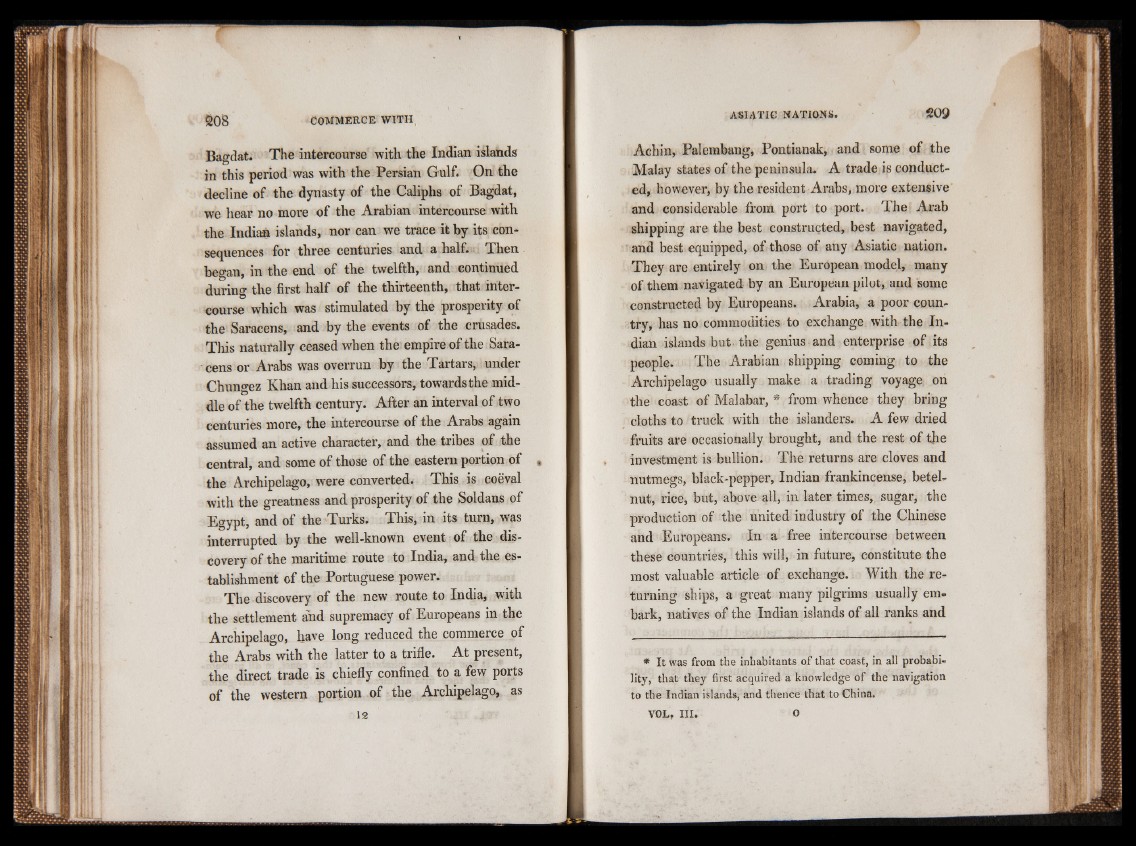
Bagdat. The intercourse with the Indian islands
in this period was with the Persian Gulf- On the
decline of the dynasty of the Caliphs of Bagdat,
we hear no more of the Arabian intercourse with
the Indian islands, nor can we trace it by its consequences
for three centuries and a half. » Then -
began, in the end of the twelfth, and continued o J m during the first half of the thirteenth, that intercourse
which was stimulated by the prosperity of
the Saracens, and by the events of the crusades.
This naturally ceased when the empire of the Saracens
or Arabs was overrun by the Tartars, under
Chuno-ez Khan and his successors, towards the middle
of the twelfth century. After an interval of two
centuries more, the intercourse of the Arabs again
assumed an active character, and the tribes of the
central, and some of those of the eastern portion of
the Archipelago, were converted. This is coeval
with the greatness and prosperity of the Soldans of
Egypt, and of the Turks. This, in its turn, was
interrupted by the well-known event of the discovery
of the maritime route to India, and the establishment
of the Portuguese power.
The discovery of the new route to India, with
the settlement ahd supremacy of Europeans in the
Archipelago, have long reduced the commerce of
the Arabs with the latter to a trifle. At present,
the direct trade is chiefly confined to a few ports
of the western portion of the Archipelago, as
12
Achin, Palembang, Pontianak, and some of the
Malay states of the peninsula. A trade is conducted,
however, by the resident Arabs, more extensive
and considerable from port to port. The Arab
shipping are the best constructed, best navigated,
and best equipped, of those of any Asiatic nation.
They are entirely on the European model, many
of them navigated by an European pilot, and some
constructed by Europeans. Arabia, a poor country,
has no commodities to exchange with the Indian
islands but. the genius and enterprise of its
people. The Arabian shipping coming to the
Archipelago usually make a trading voyage on
the coast of Malabar, * from whence they bring
cloths to truck with the islanders. A few dried
fruits are occasionally brought, and the rest of the
investment is bullion. The returns are cloves and
nutmegs, black-pepper, Indian frankincense, betel-
nut, rice, but, above all, in later times, sugar, the
production of the united industry of the Chinese
and Europeans. In a free intercourse between
these countries, this will, in future, constitute the
most valuable article of exchange. With the returning
ships, a great many pilgrims usually embark,
natives of the Indian islands of all ranks and
* It was from the inhabitants of that coast, in all probability,
that they first acquired a knowledge of the navigation
to the Indian islands, and thence that to China.
VOE, III. O